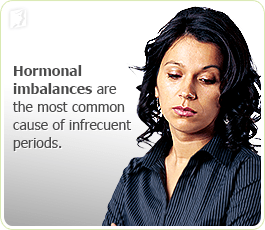
While a normal menstrual cycle occurs every 28-35 days, some women only experience their period at intervals greater than 35 days. This results in four to nine periods a year. While this is often nothing to worry about, infrequent periods may signify an underlying condition.
It is actually very common for a woman to experience infrequent periods, especially at major life stages like puberty or as a woman begins to enter menopause. Infrequent periods may also occur as a result of stress. Regardless, it is best to understand the reasons for infrequent periods and how to treat them, as well as talking with a doctor if necessary. Continue reading to learn more about infrequent periods.
About Infrequent Periods
Periods are considered as infrequent periods if a bleeding occurs after 35 days or more. Women who consistently experience infrequent periods can have as little as four to nine periods per year.
Periods that come infrequently for women who have already gone through puberty, but have not yet entered menopause may have a different condition. In this case, the medical term is oligomenorrhea. Women who are experiencing this condition should talk with a doctor to find out if it may be related to something more serious.
There is a variety of different causes that may relate to infrequent periods. Some of them are nothing to worry about, while other may require medical treatment. Continue reading to learn about the causes of infrequent periods.
Infrequent Periods Causes
The most common cause of infrequent periods can be attributed to hormonal imbalances occurring at major changes in a woman's life, such as menopause. A woman's menstrual cycle is based on the levels of sex hormones in her body. During menopause, the production of these hormones, specifically estrogen and progesterone, decreases. As the body adjusts to the lower levels, a woman may experience irregularities in her menstrual cycle like infrequent periods.
Other Infrequent Periods Causes
In addition, the following conditions and factors have been shown to be related to infrequent periods.

- As a side-effect of hormonal contraceptives, such as Depo-Provera
- Stress
- A tumor in the pituitary gland
- Other hormonal imbalances
- Polycystic ovary syndrome
- Endurance exercise
- Eating disorders
Some of these conditions are harmless or may go away on their own. Others will require medication or even surgery. In all cases, it is important to talk with a doctor about infrequent periods and what might be causing them.
In addition, some of these conditions may impact your fertility. Continue reading to learn all about the connection between infrequent periods and fertility.
Infrequent Periods and Fertility
If you experience infrequent periods, and there is no underlying condition, then it is unlikely that there will be any permanent impact to your fertility. The only problem that may result is that you may find it more difficult to time conception to coincide with ovulation. Moreover, even during perimenopause pregnancy can occur at any time.

However, if you are experiencing infrequent periods because of another medical condition, depending of the specific condition, it may impact your fertility.
To determine if there is a related medical condition that includes fertility problems, it is best to discuss your concerns with a doctor, who can make the appropriate diagnosis. Continue reading to learn more about infrequent periods diagnosis.
Infrequent Periods Diagnosis
Diagnosing the conditions related to infrequent periods usually begins with a physical examination and patient history, where your doctor will discuss any symptoms you are experiencing. From there, the doctor can perform the following tests:
Blood test. This test is most useful in determining hormonal imbalance.
Pelvic ultrasound scan. This is an imaging test that can be used to check for any structural abnormalities, such as tumors.
If a condition is identified, then the doctor can prescribe the appropriate treatment. Continue reading to learn more about treating infrequent periods.
Infrequent Periods Treatments
Treatment for infrequent periods can be determined by the cause of the irregularity and the symptoms a woman experiences. It is suggested that one begin with a treatment that is the least invasive and that produces few side effects, and if symptoms progress, treatment can be altered.

Typically, infrequent periods are a result of changes in hormone levels, therefore the most effective way to treat infrequent periods is to address the hormonal imbalance combining alternative medicines and simple lifestyle changes. If the irregularity persists, more methods such as drugs and surgery are available under the direct care of a medical professional.
Click the following link to read a complete and useful list of treatments for infrequent periods.
Sources
- Wilson EE. Polycystic ovarian syndrome and hyperandrogenism. In: Schorge JO, et al. Williams Gynecology. New York, N.Y.: The McGraw-Hill Companies; 2008. http://www.accessmedicine.com/content.aspx?aid=3157034. Accessed June 28, 2011.
- Barbieri RL, et al. Clinical manifestations of polycystic ovary syndrome in adults. http://www.uptodate.com/home/index.html. Accessed June 28, 2011.
- Ehrmann DA. Polycystic ovary syndrome. New England Journal of Medicine. 2005;352:1223.
- Azziz RA, et al. The androgen excess and PCOS society criteria for the polycystic ovary syndrome: The complete task force report. Fertility and Sterility. 2009;91:456.
